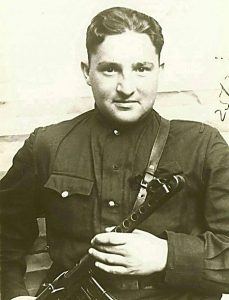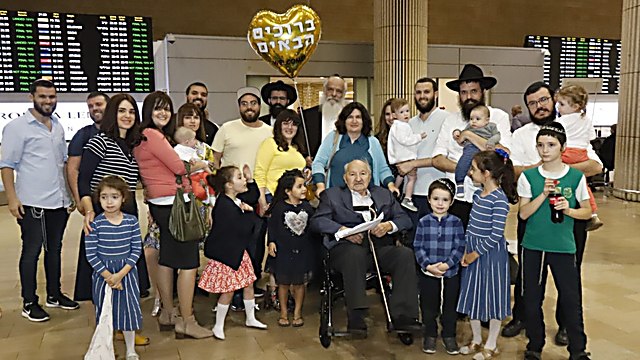Michael Okunieff
 Holocaust survivor who fought Nazis makes aliyah at 96
Holocaust survivor who fought Nazis makes aliyah at 96
After bidding farewell to his wife, who is buried at the Jewish cemetery in Chicago, Dr. Michael Okunieff packed up his personal belongings and set out to fulfill his dream of living in Israel/Attila Somfalvi, Alexandra Lukash, Meshi Ayad|Published: 11.27.19
Ninety-six-year-old Dr. Michael Okunieff has been getting used to his new status in recent days – an Israeli citizen.
Holocaust survivor bid farewell to his late wife, who is buried in the Jewish Cemetery in Chicago, Illinois, packed up his personal belongings for the last time and traveled to a new land - the Holy Land.
The dozens of Okunieff's relatives already live in Israel, and were waiting to welcome him at Ben-Gurion Airport. He says his daughter, 10 grandchildren and 21 great-grandchildren are one of the main reasons behind his dramatic move at this stage of life, but not the only one.
Okunieff told Ynet that moving to the Jewish state the fulfillment of a life-long dream, jokingly adding that he is there to "help Israel to survive."
"I love Israel and wanted to be in Israel," says Okunieff. "I am happy to be here, and I am trying to help my family as much as I can."
Okunieff worked as a family physician in the United States for 67 years until his retirement at the ripe age of 93.
Okunieff was born in 1923 in Vilnius, Lithuania. At the age of 18, the Nazis occupied the region and forced the city's Jews - Okunieff among them - into a ghetto. From there, Okunieff joined the Fareynikte Partizaner Organizatsye (Yiddish for United Partisan Organization) established by prominent Jewish partisan leader Abba Kovner.
The clandestine organization unsuccessfully tried to carry out an insurrection against the Nazis, with its members fleeing the ghetto to hide in the forests. The partisans continued to smuggle Jews out of the ghetto and fight the Nazis until the ghetto's liquidation in September 1943.
"My grandfather is probably one of the last Jewish partisans still alive today," says Okunieff's grandson, David Persiko.
"He always told us that he was among the youngest to fight among their ranks. He was subordinate to Abba Kovner and was close friends with (author and historian) Chaim Lazar."
According to Persiko, his grandfather helped smuggle about 75 Jewish children between the ages 10-13 from Zakopane in Poland to Czechoslovakia, that was relatively safe for Jews.
"He led the group as an adult and was the only one with a weapon," he says. "During their escape, they were shot at by the Poles, but luckily they managed to cross the border to Czechoslovakia."
Persiko says that although his grandfather followed his friends to the U.S. after the war, Okunieff never stopped being a staunch Zionist.
"Between the years 1947-1948, my grandfather, a medical student at the University of Munich, was in charge of purchasing weapons on the black market and hiding them until another group would transfer the weapons to Israel," says Persiko.
Now Okunieff has fulfilled his dream of aliyah, with a little help from the Ministry of Aliyah and Integration and the Nefesh B'Nefesh organization.
Michael's testimony at the Jabotinski's archives



